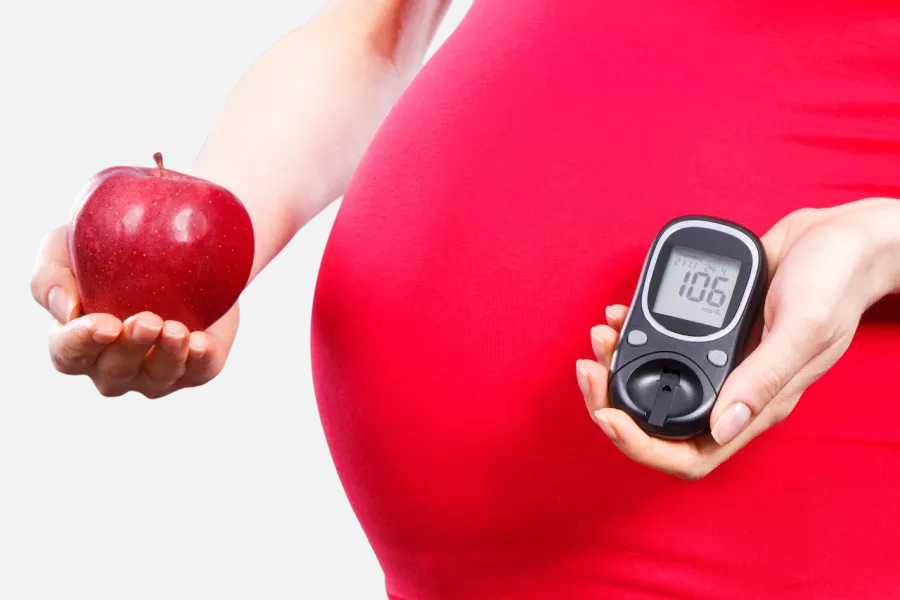Gestational diabetes is a health problem that some women may face during pregnancy, as blood sugar levels rise due to hormonal changes.
Although it often goes away after delivery, proper management is essential to protect both mother and fetus from complications.
What is gestational diabetes?
Gestational diabetes is a type of diabetes that occurs for the first time during pregnancy. It is usually diagnosed in the second or third trimester and causes the body's inability to use insulin efficiently, leading to high blood glucose levels.
Causes of gestational diabetes
Several factors may increase the risk, including:
- Hormonal changes that reduce insulin's effectiveness.
- Being overweight or obese before pregnancy.
- A family history of diabetes.
- Pregnancy at an age older than 30.
- Pregnancy with twins or multiples.
Symptoms of gestational diabetes

In many cases, there may be no obvious symptoms, but possible signs include:
- Excessive thirst and frequent urination.
- Constant fatigue.
- Blurred vision.
- Increased urinary tract or fungal infections.
The Effects of Gestational Diabetes on the Fetus
If gestational diabetes is not controlled, the fetus may be exposed to some complications, including:
- Increased fetal weight, which may complicate natural delivery.
- Low blood sugar levels in the newborn immediately after birth.
- Breathing problems in the baby after birth.
- Increased risk of premature birth.
- Increased risk of the child developing diabetes or obesity in the future.
Complications of Gestational Diabetes on the Mother
If blood sugar levels are not controlled, the pregnant woman may face some complications, such as:
- High blood pressure and preeclampsia.
- Increased risk of cesarean delivery due to the large size of the fetus.
- Recurrent infections, such as urinary tract infections and vaginal infections.
- Increased risk of developing type 2 diabetes after delivery.
- Excessive weight gain during pregnancy and difficulty losing it after delivery.
Methods for Diagnosing Gestational Diabetes
Usually, diagnosis is made between weeks 24-28 of pregnancy using:
- Glucose tolerance test.
- Fasting blood glucose test.
- Regularly monitor blood sugar levels during pregnancy.
Methods for preventing gestational diabetes

It can't always be prevented, but the risk can be reduced by:
- Maintaining a healthy weight before and during pregnancy.
- Eating a balanced diet rich in vegetables and low-fat proteins.
- Engaging in regular physical activity, such as walking.
- Avoiding sugary foods and soft drinks.
Methods for treating gestational diabetes
Gestational diabetes can be controlled and its complications prevented by following simple and safe treatment methods under the supervision of a doctor, most notably:
- Adhering to a healthy diet and exercising.
- Regularly monitoring blood sugar.
- Insulin: Your doctor may prescribe it if dietary changes aren't sufficient.
- Avoid oral diabetes medications during pregnancy unless recommended by your doctor.
When should you consult a doctor?
You should see a doctor immediately if you experience symptoms such as excessive thirst, unexplained weight loss, or elevated blood sugar test results. You should also adhere to regular follow-up visits throughout your pregnancy.
Does gestational diabetes go away after delivery?
Yes, it often goes away after delivery, but the mother remains at risk of developing diabetes in the future.
Is it possible to have a natural birth with gestational diabetes?
Yes, if your blood sugar is under control. However, your doctor may recommend a cesarean section if your baby is large.
A summary of the causes of gestational diabetes and the best ways to control it
Gestational diabetes is a common condition caused by hormonal changes during pregnancy. It requires close monitoring to avoid complications for both mother and fetus.
It can be controlled with a healthy diet, physical activity, and sometimes insulin under a doctor's supervision.